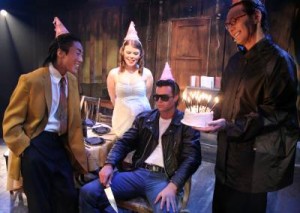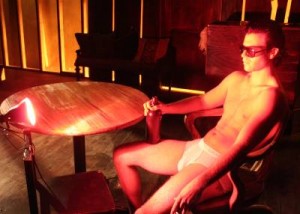NOT RECOMMENDED
The Fastest Clock in the Universe, by Philip Ridley, is the blackest of black
comedies. Captain Tock, a 50ish bespectacled gent in a black vaguely Chinese
smock and dark trousers, shares an East End of London flat with a much younger
and entirely self-centered hunk named Cougar Glass. Their relationship is
perversely symbiotic. Symbiotic= a close association of animals or plants of different
species that is often, but not always, of mutual benefit. (Emphasis in this case on
the “not of mutual benefit.”) Glass gets adoration from (and gray hairs plucked
by) Tock. Just what Tock gets from Cougar, other than constant humiliation, is
open to debate. Today is the 11th time Cougar is celebrating his 30th birthday,
and he has invited a 15 year old schoolboy as his annual present to himself. When
the schoolboy arrives with his pregnant girlfriend in hand, things get ugly.
More a potential cult hit than one likely to please the Celebration’s core
audience, The Fastest Clock in the Universe boasts possibly the most extraordinary
design of any Celebration production I’ve seen. Casey Hayes’ set is creepy
perfection. From its chicken wire walls, to its stuffed crows on display, to few pieces
of old wooden furniture, to the hanging light fixture like one in a police
interrogation room, this is a flat one might bear visiting, but one sure as heck
wouldn’t want to live in. Tim Swiss’s moody lighting filtered through a constant
haze of theatrical smoke sets the mood perfectly, and Marjorie Lockwood’s
costumes are just a bit “off normal,” as are the characters who wear them.
Under Lynn Ann Bernatowicz’s directions, the cast of five do for the most part
quite good work. Justin Shilton is uncannily believable as the cold, vain, and selfish
Cougar, and Christopher Snell (resembling Ralph Fiennes as character actor)
captures Tock’s pain, anger, frustration, and humiliation. Nick Endres does well at
expressing 15-year-old Foxtrot Darling’s wide-eyed naïveté, though I found him
miscast. One of my longtime favorite L.A. (via New York) actresses, Francesca
Casale, abandons all vanity in a memorable turn as 80-year-old Cheetah Bee.
Shuffling in behind her fur-covered walker, her hunched back covered by a ratty
old mink coat, her head turbaned and her eyes and cheeks sunken by make-up,
Casale is the crone to end all crones. She appears to be having a hoot playing the
role, and I enjoyed seeing her going so against age and type.
Shilton, Snell, and Casale share one of the most bizarre scenes in the production,
which happens to be very funny as well. The discovery of a few too many gray
hairs among his dyed black locks has sent Cougar in a tailspin. Tock’s solution is (as
usual) to call on ancient neighbor Cheetah to compare one by one her decaying
body parts to Cougar’s yet youthful ones, each time intoning, “I am at the end
and you are at the beginning,” until finally Cougar regains his self-confidence.
The standout performance of the evening is by Tuffet Schmelzle, who may for the
first time in her career, not have the most unusual name in the playbill. Schmelzle,
as Foxtrot’s pregnant girlfriend (aka Sherbet Gravel) appears at first to be all fresh-
faced rosy-cheeked innocence and sweetness (despite her protruding belly). Then
Schmelzle reveals a tougher, darker side, and a performance that was already a
standout becomes downright electric.
The Fastest Clock in the Universe is most definitely not a feel-good play. Not that
every gay-themed play has to be an upper, but this one really is a downer, and
the cruel and violent turn it takes at the end is offputting to say the least. Still, it
merits attention if only for its award-caliber design and some very good acting.
Celebration Theatre, 7051B Santa Monica Blvd., Hollywood.
–Steven Stanley
October 18, 2007




 Since 2007, Steven Stanley's StageSceneLA.com has spotlighted the best in Southern California theater via reviews, interviews, and its annual StageSceneLA Scenies.
Since 2007, Steven Stanley's StageSceneLA.com has spotlighted the best in Southern California theater via reviews, interviews, and its annual StageSceneLA Scenies.







 COPYRIGHT 2024 STEVEN STANLEY :: DESIGN BY
COPYRIGHT 2024 STEVEN STANLEY :: DESIGN BY